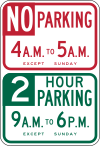Key:parking:condition
| Description |
|---|
| Using this tag is discouraged, use Street parking instead. |
| Group: parking |
| Used on these elements |
| Useful combination |
| Status: deprecated |
| Tools for this tag |
|
The reason is documented in Deprecated features. You are still free to continue to use or interpret this tag as you see fit since OpenStreetMap does not have “banned features”.
Under no circumstances should you (semi-)automatically change “deprecated” tags to something else in the database on a large scale without conforming to the automated edits code of conduct. Any such change will be reverted.
This page documents the usage of the key parking:condition=* to indicate the legal properties of a parking lane or if parking is allowed on a road. It can be added to ways tagged with highway=*.
- parking:condition=* describes the legal properties of the parking space. This tag is also the default value when used in combination with conditionals.
- parking:lane=*, a similar but different tag, is used to describe the physical properties of the parking space.
Both can be used independently of each other, they do not necessarily require the other.
- The key parking:condition=* should always be used with the appended subtags :both, :left, or :right; indicating the side of the street they apply to.[1]
- The roadway needs to be split up where any of the parking condition changes.
Parking conditions
The parking:condition tag describes the legal properties of the parking space. This tag is also the default value when used in combination with conditionals.
Note: Do not confuse condition with conditional. The former is part of the parking:condition tag while the latter is for conditional restrictions and only added at the end of a key.
| Key | Value | Description |
|---|---|---|
| parking:condition:side | free | The parking is free to use. If there is a time limit, add a parking:condition:side:maxstay=* tag |
| ticket | A ticket is required. This can be a physical ticket, electronic ticket via SMS or through an app, etc. If possible add the location of the ticket machine(s) nearby using the amenity=vending_machine + vending=parking_tickets tags. | |
| disc | A parking disc is required. Add a parking:condition:side:maxstay=2 hours tag to describe the time limit, for example 2 hours. | |
| residents | Add a parking:condition:side:residents=A tag. This means "parking only for residents with permission A" (With A being the identification of the permission). | |
| customers | This means you are only allowed to park here if you are a customer of the shop that owns this parking space (or a visitor of a site, or a guest of a hotel, or similar). If additional restrictions apply, such as a time limit, add those. | |
| private | No additional information is required. This means you are only allowed to park here if you rented the parking space (or have a permission of the owner). | |
| disabled | Usually, this parking space is not about free or paid. It requires being related to disabled persons or to have such permission. | |
| loading | Parking is not allowed, but standing for loading or unloading is explicitly allowed. In contrast to no_parking, loading and unloading is explicitly designated, e.g. with a traffic sign, and depending on the legal situation, there is no or a different maxstay period. | |
| no_parking | No regular road user is allowed to park on the road. They may stop, though, to for example pick up/drop off a passenger, unload cargo or for other reasons as laid out in the local legislation. | |
| no_standing | No regular road user is allowed to park on the road. They may stop, as long as they remain in the vehicle, to for example pick up/drop off a passenger or for other reasons as laid out in the local legislation. | |
| no_stopping | No regular road user is allowed to stop their vehicle, except when traffic conditions require them to do so. In addition this also implies that neither standing nor parking is allowed. | |
| no | There is no explicit signage that prohibits parking, standing or stopping, but some of these are not allowed, and it is not possible to distinguish the exact conditions. |
Type of vehicles
If the condition is valid only for some vehicles, use
- parking:condition:both:motorcar=free to specify the type of vehicle it applies to.
If vehicles are only allowed at certain times, use conditional tags, like so
- parking:condition:both:hgv:conditional=free @ (08:00-18:00) (only HGV during the day, no restrictions at night)
or
- parking:condition:both:hgv=free (always HGV)
- parking:condition:both:bus:conditional=free @ (Sa-Su) (and also buses on weekends)
A total ban on lorries would be
- parking:condition:both:hgv=no_parking (no parking only for HGVs)
Residential permits
Area based residential permits often carry some sort of letter or code identifying the area wherein they are valid; this can be recorded using the key: parking:condition:side:residents.
When parking requires either a ticket or a residential permit (named "A" in this example), specify both conditions in the main value and further describe the residential permit in another tag that is specific to that condition
- parking:condition:both=ticket;residents
- parking:condition:both:residents=A
Time dependence (conditional)
On many occasions, parking conditions are time limited, especially for disc and residents parking. This can be specified by using the conditional tag: parking:condition:side:conditional. It uses the same syntax for values as conditional restrictions.
In the simplest case you have free parking at night, and ticket parking at day on workdays; for example,
- parking:condition:right=free (The default is free)
- parking:condition:right:conditional=ticket @ (Mo-Fr 09:00-19:00) (But on workdays, paid parking)
Sometimes specifying one default condition is not enough. In these cases we end up with an abundance of tags, for example:
- parking:lane:right=parallel
- parking:condition:right=free (By default this is a free parking)
- parking:condition:right:conditional=no_stopping @ (Mo-Fr 07:00-09:00); disc @ (Mo-Fr 09:00-18:00) (No stopping during morning rush hour. At daytime, disc parking only)
- parking:condition:right:maxstay:conditional=30 minutes @ (Mo-Fr 09:00-18:00) (And only a 30 minute stay)
Note: The use of additional namespaces (:1, :2, etc.) is deprecated.
Maximum stay
Use parking:condition:side:maxstay to specify maximum stay limits; especially applicable for disc parking. It should take values precisely as per maxstay.
If this applies only part of the day, use parking:condition:side:maxstay:conditional.
Reasons for the condition (optional)
It is often useful to indicate why certain conditions apply. This allows telling a fire lane from a loading zone or an implicit condition (e.g., no parking near a crossing) from an explicit condition (no stopping sign on a busy thoroughfare). Use the parking:condition:side:reason tag to describe the reason for prohibitions in the condition when needed.
Note: Tagging this is optional. The list of reasons below is not a complete list, just a collection of the most common ones.
| Key | Value | Description |
|---|---|---|
| parking:condition:side:reason | bus_stop | This is a bus stop, where according to local legislation, certain rules apply. |
| crossing | This is near a crossing, where according to local legislation, certain rules apply. | |
| driveway | This is near a driveway, where according to local legislation, certain rules apply. | |
| dual_carriage | This way is part of a dual carraigeway, wherer according to local legislation, certain rules apply. | |
| fire_lane | This is a fire lane that must be kept clear for possible fire engines, or other emergency vehicles. | |
| junction | This is part of a junction and according to local legislation, certain rules apply. | |
| loading_zone | This is a zone for loading and unloading of goods and/or passengers. | |
| narrow | This is a narrow street, influencing the ability to park here. | |
| passenger_loading_zone | This is a zone for loading and unloading of passengers only, not goods. | |
| priority_road | This is a priority road. According to local legislation certain rules apply. | |
| street_cleaning | This is a street cleaning zone where vehicles intermittently may not be allowed to park, stand or stop. This includes snow removal. | |
| turnaround | This is a zone for turning a vehicle around, typically at a cul-de-sac. | |
| turn_lane | This is part of a turn lane and according to local legislation, certain rules apply. |
Separately mapped parking
parking:lane:both=separate / parking:lane:left=separate / parking:lane:right=separate are in use to mark that parking lane was separately mapped as an amenity=parking area.
Examples
All examples below assume a parking lane on the right side of the road.
| Sign | Tags |
|---|---|
| parking:condition:right=free (This is a free parking with no other restrictions.) | |
|
parking:condition:right=free (By default, this is a free parking with no other restrictions.) | |
|
parking:condition:right=free (By default, this is a free parking with no other restrictions.) | |
| parking:condition:right=no_parking (No parking anytime.) | |
|
parking:condition:right=no_parking (By default, no parking.) | |
|
parking:condition:right=no_stopping (No stopping anytime.) | |
|
parking:condition:right=free (When the conditional restriction is not in place, this is a free parking.) | |
|
parking:condition:right:hgv=free (This is a free parking, but only for lorries and trucks.) | |
|
parking:condition:right:hgv=no_parking (Parking is prohibited, but only for lorries and trucks.) | |
 
|
parking:condition:right=no_parking (No parking anytime.) |
 
|
parking:condition:right=no_parking (By default, no parking.) |
|
parking:condition:right=ticket (Paid parking.) | |
|
parking:condition:right=free (This is a free parking.) | |
|
parking:condition:right=free (By default, this is a free parking.) | |
 Road section within the junction Road section within the junction
|
|
|
parking:condition:both=no_stopping (No stopping anytime) or parking:condition:both=no (No explicit signage, also OK but no_stopping is a bit more preferable) | |

|
parking:lane:right=parallel |

|
See also
- Opening hours
- parking:lane=* - to indicate the physical presence of a parking lane
- amenity=parking - A place for parking cars
- access=* - For describing the legal accessibility of a feature
- maxstay=* - Maximum time you are allowed to stay somewhere
- fee=* - Yes or no, to indicate if money is charged to use this facility
- amenity=vending_machine + vending=parking_tickets - A machine selling tickets for parking
References
- ↑ It is intentional to use left and right instead of forward and backward, because parking is about location, not direction. E.g., a one-way sometimes has parking at the left and at the right hand side, but no "backward" parking. See Forward & backward, left & right.












